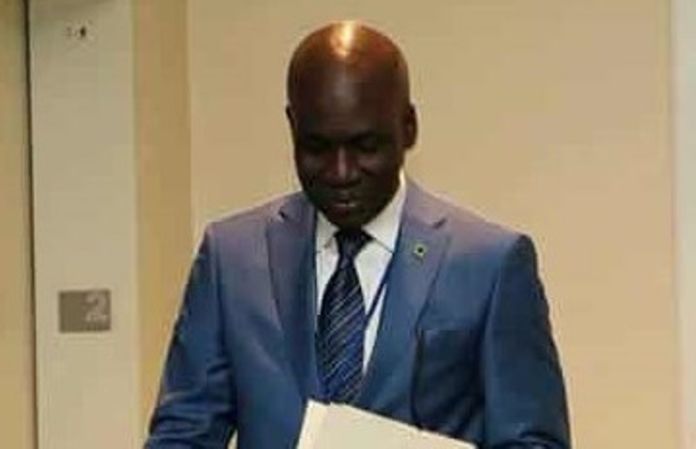The Gambia Government has rejected the Janneh Commission of Inquiry recommendation for head of Protocol at the Presidency Alagie Ousman Ceesay to be dismissed from his current post.
This decision is contained in the White Paper issued by the Gambia Government in reaction to the findings and recommendations of the Janneh Commission. See the Government’s decision below;
Alagie Ousman Ceesay is a civil servant and the current head of protocol. He has served in various capacities since 1995 including Assistant Secretary at the Ministry of Education, First Secretary at The Gambia High Commission in Dakar, Deputy Chief of Protocol, Director General of Protocol at the Ministry of Foreign Affairs, and Deputy Permanent Secretary at the Office of the First Lady. He was appointed as Chief of Protocol to His Excellency, President Adama Barrow, in January 2017. He was also Chief of Protocol to former President Jammeh in 2002.
The Commission found, inter alia,that Mr. Alhagie Ceesay, among other protocol officers of State, and on the instructions of former President Jammeh collected cash withdrawals authorized by former President Jammeh from the Central Bank of The Gambia. Mr. Alhagie was responsible for collecting a total of $2,669,593.80 between July 2014 and July 2015; D12,000,000 in 2012; and $2,000,000 in 2009.
The Commission also found that the Office of the President established office for Zineb Jammeh. Accounts were opened at the GTB in October 2016 and Zineb Jammeh was signatory to the accounts along with her protocol officer, Mr Alhagie Ceesay. Three accounts were opened – a Dollar, Dalasi and Euro account. While the accounts were classified by the Bank as Government accounts, they were used for Zineb Jammeh’s private purposes and to facilitate the transfer of cash out of The Gambia. All withdrawals from the accounts were swift transfers by Mr Alhagie Cessay either Zineb Jammeh’s US Bank accounts or employees in Morocco and the Potomac residence Maryland or to other individuals. According to the Commission, at least $1,626,786 was transferred from public accounts including over the counter cash transfers by various protocol officers for Zineb Jammeh including Mr Alhagie Ceesay. The Commission further found that these happened over as span of 2 years to maintain Zineb Jammeh’s expensive lifestyle.
The Commission found that the accounts were funded by cash deposits mainly by Mr Alhagie Ceesay. The Commission concluded that the cash was provided by former President Jammeh from misappropriated public funds. The Commission found that Mr Alhagie Ceesay travelled extensively with both former President Jammeh and, latterly, Zineb Jammeh and as such became involved in some of their financial activities.
The Commission noted with concern that Mr Alhagie Ceesay seemed to have accepted as normal the many errands on which he was sent to execute financial transactions for former President Jammeh under questionable circumstances. The Commission found that there is probable cause for holding that Mr alhagie Ceesay knew what the funds were intended for.
The Government accepts, in part, the findings of the Commission is so far as they relate to Mr Alhagie Ousman Ceesay. In particular, the Government accepts that Mr Alhagie Ceesay conducted several financial transactions including the receipt and collection of monies on behalf of former President Jammeh and Zineb Jammeh on their instructions.
The Government, however, rejects the Commission’s finding that there is probable cause for holding that Mr Alhagie Ceesay aided and abetted former President Jammeh and Zineb Jammeh in their illegal appropriation of public funds for the reasons below.
The duties and functions of State Protocol Officers are very wide and varied. In reality, they carry out a range of activities for their principals, and enjoy a unique position of confidence within the State architecture which is necessitated by the functions of their office. Tellingly, the Commission did not make any findings of infringement of any specific policies, guidelines or regulations that govern the functions and duties of State Protocol Officers. Indeed, none exist. And, it is in recognition of the absence of any such policies, guidelines or regulations that the Commission recommended that “clear policies should be set up by the Personnel Management Officer (PMO) so that Protocol Officers fully comprehend what their roles and responsibilities are. The role of the Protocol Officers at OP should be reviewed with a view to setting guidelines and limits as to their functions in relation to the private financial affairs of the First Families”.
Neither has the Commission illustrated from other jurisdictions the roles and responsibilities of State Protocol Officers as a yardstick against which the conduct of Mr Alhagie Ceesay and other State Protocol Officers could be measured; nor did the Commission refer to the terms of employment of Mr Alhagie Ceesay.
In the circumstances, it is difficult to impute an individual culpable mental element on Mr Alhagie Ceesay given the nature of his work and the lack of clarity surrounding it. With this in mind, the Government is of the view that, similar to the principle of nullum crimen sine lege, it would be unfair and against the rules of natural justice to hold State Protocol Officers against standards which were non-existent at the time of these activities.
Consequently, the Government rejects the Commission’s recommendation that Mr Alhagie Ceesay should be dismissed. The same applies by extension to all other Protocol Officers against whom adverse findings were made in respect of similar conduct under similar circumstance. Instead, the Government accepts the recommendations of the Commission “clear policies should be set up by the Personnel Management Officer (PMO) so that Protocol Officers fully comprehend what their roles and responsibilities are. The role of the Protocol Officers at OP should be reviewed with a view to setting guidelines and limits as to their functions in relation to the private financial affairs of the First Families”.


















